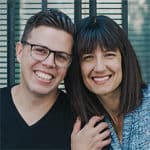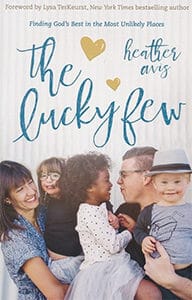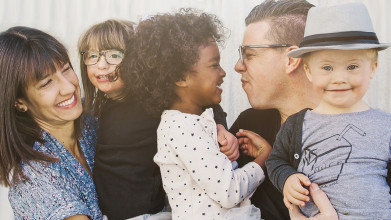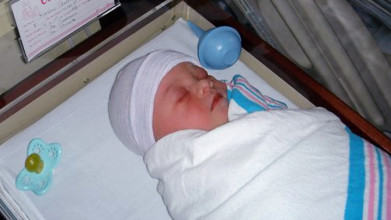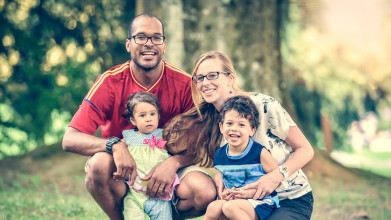Opening:
Excerpt:
Heather Avis: Instantly God did something in my heart when I read those words “babies with Down Syndrome.” And it was instantaneous and it was– I was not excited about this. I wasn’t like, yes, Lord, let’s step towards this. I was like, no, no, no, no, no– no. And like, Josh and I lagged behind and he’s like, what’s going on. I tell him and I’m waiting for him to say, oh no, that’s not what we’re gonna do. And he goes, yeah, I think we should pray about that.
End of Excerpt
John Fuller: On our last Focus on the Family broadcast, we heard from Heather and Josh Avis and they’re back again today talking about the road of infertility and how God began to turn their hearts toward adoption. And it’s an amazing story and we’re glad to have them back. Your host is Focus president and author Jim Daly and I’m John Fuller.
Jim Daly: John, last time we started a great conversation about how God worked through one couple’s heart to begin that adoption process. And they now have three wonderful children, two of whom have Down syndrome. Here at Focus on the Family, we believe that every child deserves a good home, which is why we’ve started our Wait No More campaign to get children adopted out of the foster care program and to place them in loving homes, like the couple you’re about to hear from. Around the world, there is a huge and pressing need for the Christian community – Christian families – to step forward and begin the adoption process. Even if you don’t feel called to adopt, each of us can do something. You can wrap around an adoptive home and do some chores. Do the laundry for them. Do grocery shopping for them. What a beautiful expression of the love of Christ for that family.
John: And you can find – uh – ways that you can, really, practically help adoptive families and start that journey yourself if God is calling you to adopt at focusonthefamily.com/radio or call 1-800-A-FAMILY. And when you get in touch, be sure to ask about a CD of our last conversation with Heather and Josh. It’s really inspiring. And Jim, what I love about their story is the value of every life. Um, there’s such a sanctity of life message here. Josh and Heather are from Southern California. And Heather has captured their story in the bookThe Lucky Few.
Body:
Jim: Heather and Josh, welcome back to Focus.
Heather: Thank you so much.
Josh Avis: Thank you, it’s an honor.
Jim: It was so wonderful last time. You spoke so boldly, so transparently. And I’m sure – I know listeners connected with where you were at, what you have walked through, how God has sustained you. And again, John, if people missed that, I would get that through a download or just call us, we’ll get you the CD, whatever we can do. But it was really inspiring. And that’s a big word to use. Um, I want to continue on. We dropped off last time where you had been working with an agency; you’d just taken the trip to Romania – a missions trip. The agency had texted you or emailed you saying we have two kids, but they both have Down syndrome. It’s hard to place Down syndrome children. But right at that moment, you kind of thought OK, maybe. I do want to say – um – it’s almost angelic. I mean, most people would say I can’t carry that burden. That’s too much for me. The Lord will know. I’ve got so much that’s going on. Um, how did you process that? How did you say I could do this? You’ve only been married four years, you’re young, in your mid-20s. This is going to be a load. This isn’t just, you know, normal parenting.
Heather: Yeah, definitely.
Jim: How?
Heather: Um, God had kept nudging us along the way. We had a week left in Europe that Josh and I just did together. We went to Greece. And we spent that entire week – the majority of our conversations were around this idea of adopting a child with Down syndrome. And – um – Josh would make lists, pros and cons lists. I’m not that organized in the way that I think, but Josh is. And he would do lists, pros and cons. And – um – what it really came down to is as people who love Jesus and who desire to have a heart that beats like his, not one of the items on the con list was a good enough item to say no to being parents to a child who needed parents, that at the end of the day there was a baby who needed a mom and a dad. We were a mom and dad. That was it. And that’s enough. And that’s enough. And I think that’s a huge piece of adoption, is at the end of the day, there’s a child that needs a family. You can be a family and that can be enough. We moved forward in that way. And even after saying OK, yes, let’s learn more, we got home from Europe, called the social worker. It’s a very long story. But we – even in that moving forward, it was like, OK – it was aroller coaster. We’re so excited. We got this. And then an hour later no, no, no, we cannot do this. What would this look like for our life? This is terrifying. This is overwhelming. We’re not equipped. And the next day– OK, we can do it. We can do it. So it wasn’t just a seamless–
Jim: No, and I appreciate that. So that vacillation, did it come from both of you? Or was it one of you, predominantly, that you were retreating after going forward? Or was it a shared kind of thing where depending upon the day, Josh, you were saying honey, come on, really? And then the next day it was you. I mean, that’s completely natural. I understand this.
Josh: Yeah.
Heather: Yeah, for sure.
Josh: Yeah, it was definitely a process for sure. It was up and down. I think it was a lot of hard conversations where I would pull her up or she would pull me up or you would try to convince the other or – and even hard conversations with family, to be honest, and hard conversations with our support around us saying are you sure about this? And so…
John: Were family members saying hey, don’t do this?
Josh: I think they’re just protective of us.
Heather: Right. No one ever flat out said don’t do this. But it was a lot of like,
Josh: Oh!
Heather: OK. Tell us more. Why are you doing this? Um, I have always been, like, a cheerleader for the underdog since I was really little, like since my parents can recall and since I can recall I’ve had this heart that breaks for the brokenhearted. And so my mom, I think, was worried that I was trying to rescue, that I was trying to do this big noble thing and rescue this poor, poor child and – and that my intentions maybe weren’t going to be healthy in the long run for me. And I’m her daughter, you know? So she’s looking at me as her daughter. Like, how – what is this gonna mean for your life? And so I did have a conversation with my mom, um, where I just had to say, hey, Mom, you have to trust who you raised me to be, who God’s made me to be and what he’s calling us to in this. I need you to just trust right now.
Jim: Did the question – did you appreciate the question for solidifying the decision you already had in your heart? Was there any appreciation for your mom’s forcefulness with that?
Heather: Oh, absolutely. Yeah.
Jim: I mean, I could see myself as a dad…
Josh: Yeah.
Jim: …Of a now 17-year-old.
Josh: Right?
Jim: In a few years, he might make that decision. I might ask that question.
Heather: Right.
John: Yeah.
Jim: In part, just to make sure that my adult son or daughter…
Josh: Yeah. Yeah.
Jim: …Really has counted the cost.
Heather: Right. Yeah. And so – and I think that’s also why we went to our parents and went to our people who we could love and trust because we needed…
Josh: That support.
Heather: …yeah, that support and the different perspective. We needed people to be pushing back because it was a big decision for us. And we – I was 27 years old, you know? And it was a big decision because I – we also, at any given time, could have said no firmly and officially and then, probably within a few weeks, been receiving a phone call for this healthy infant we’d been waiting for.
Jim: Yeah. Sure. Let me just – the thought came to me. Do you think either of your parents – did they think, what are we being pulled into here when we have to babysit…
Heather: Right.
Jim: …And caretake? Was there any of that consideration that you’re aware of?
Heather: I’m sure. Sure.
Jim: I mean, I hadn’t thought about that, but that would be a normal grandparenting question here.
Heather: Right. Yeah. I think there is – a lot of people’s first reaction is, what does this mean long-term? Like, this – what are you gonna do with this child when you’re gone?
John: Right.
Heather: Who’s taking care of this child as an adult? And things are very different now in the Down syndrome world. That narrative’s really changing significantly. That’s a whole other topic. But definitely, I think all – everyone in our family was like, OK, this has huge implications on the entire family, because it does, you know? And even my – I have an older sister who had two kids at the time and thinking of my – our future daughter’s cousins and that there is – there’s no burden or pressure on anybody. But if the day comes that no one can care for our daughter and she does need extra care, is it my nephew and niece, you know? Like, that – everyone here is affected. And before that child entered our lives, the child with Down syndrome, I think that it is this idea of, this is – this is a lot. This is heavy. This is too much. And then enter said child, and everyone’s tune changes almost instantly to, like, oh, no, I get her. I get her. I get her. Like, this battle over that.
Jim: Well, I – I have a smile on my face because I know the kids are with the grandparents right now.
Heather: Yeah. (Laughter)
Jim: (Laughter) So that’s proof in the pudding.
Josh: Right.
Jim: You know, some people, Heather and Josh, may not even understand the diagnosis of Down syndrome. They hear it, and we’ve heard it in the news lately. There’s some things that have happened in other countries. What are the obstacles? What are the hurdles? What does a Down syndrome child display?
Heather: Yeah. So Down syndrome is just the 21st chromosome. They have three 21st chromosomes. So everyone with Down syndrome has one extra chromosome. So it’s called trisomy 21. So that’s the scientific…
Josh: Medical.
Heather: …Description – medical, I don’t know. And the thing that – with Down syndrome is there are some similar characteristics. So often it’s – like, there’s physical. So like, an almond-shaped eye, usually a little bit smaller in stature, flat face, like a flatter nose. Um…
Josh: Low muscle tone.
Heather: Low tone is very common, and some kind of an intellectual disability. And then there can be heart defects. Um, I think it’s about 60 percent of kids with Down syndrome are born with a heart defect. And hearing problems, vision problems, um, higher likelihood for leukemia, higher likelihood for Alzheimer’s. So those are all characteristics that are terrifying – right? – on paper. Um, I think that we forget, as people, that when you’re giving birth to a child who has no special needs, that a lot of those are the same risks as they get older. Right? Like, there are – if you’re gonna look at – there’s all these possibilities for this child who’s totally healthy at birth. They could also have any one of these things. Not – not to say that – that they’re the same with Down syndrome.
Jim: Um, now let’s move through that story a little more because you didn’t stop there. This is number one. What happened?What’s it like bringing Macyn home, night one, week one…
Heather: (Laughter) Oh, gosh.
Josh: Oh my gosh.
Jim: …Month one, year one?
Heather: I mean- right- we have to back up a tiny bit, that when we first – so we – we say, yes, we want to move forward with possibly adopting a child with Down syndrome. And then the social worker says, oh, OK, well, one of those babies was placed, and the other one is so – we just find out all these medical needs. We’re not looking at placing her. And we recognized later that they thought she wasn’t going to live. They thought – they had just….
Jim: So they were protecting everybody.
Heather: Yes. They were protecting their adoptive families.
Josh: She wasn’t an option.
Jim: Sure.
Heather: …They had just discovered this lung condition called pulmonary hypertension and that her heart defect was more severe than they had recognized. And at six weeks old, which is when we had found out about her, she was going to go in for a heart surgery – not open-heart, but, like, a – a very serious heart surgery to help prolong her life. And that’s where we had called and said we’re interested. And they’re saying, oh, my gosh. We don’t know that she’s going to live through the surgery. But they’re not telling us that. So we hang up the phone and go, oh, my gosh. What if we don’t get a kid with Down syndrome? And we were recognizing that God had did a complete shift in our hearts in that regard. And then we went along our lives. And a month later, they call and say, hey, that little girl we told you about went through a surgery. We have a better grasp on her health. Are you still interested? We said yes. And we go in, learn more about her. And all of sudden, Down syndrome is a back-burner issue because she’s on medications, she’s on oxygen 24/7. Her lung condition is so severe that they don’t know how long she’s going to live. And we’re just like, ah, what are you doing, Lord?
Josh: Very…
Heather: It was very frustrating.
Josh: It became a baby with – with – was very medically fragile.
Heather: Right.
Jim: Right. Yeah.
Heather: And so now we’re not just saying to Down syndrome – we’re saying yes to, we don’t know. Like, a list.
Jim: But you’re pressing ahead.
Heather: Right.
Jim: Some of us are shaking our head.
Heather: Oh, I know.No, we were shaking our heads and still we were…
Jim: (Laughter) Shaking your head and pressing ahead.
Heather: We didn’t want to say yes, but we knew no wasn’t the answer. So we kept taking steps forward. That’s what that looked like for us in that moment. And I think, when I talk to a lot of people who say, like, how do you move forward when things are so scary and things are so challenging? And I – for us, it was one foot in front of the other. Literally, like, I’m gonna lift up my foot. I’m gonna put it down. I have no idea where my second step is, and I don’t have to know that. I just have to know this one.
Jim: You know, I want to just bring in some of the statistics because it’s so important. 70 percent of babies that are, um, in utero that are diagnosed with Down syndrome are aborted.
Heather: Yeah.
Jim: I mean, 70 percent. I know there’s been, as I mentioned before, a lot in the news about Iceland and other countries now that almost 100 percent…
Heather: Right.
Jim: …Are aborted. This kind of turns that all on its head because some of the most powerful comments that I heard is that, why are we discriminating against children that just have some different physical attributes? And they are impaired in different ways, but they’re still human beings made in the image of God…
Josh: Yeah.
Heather: Right.
Jim: …That need protection. As parents who have adopted Down syndrome children, what does that make you feel like when they are talking about eradicating Down syndrome by aborting everyone who’s diagnosed with it?
Heather: Yeah. It makes me feel – at first it’s like, wait, what? That doesn’t make any sense. Like, why would you do that? Um, because they’re the best. And then it’s infuriating, and then it’s a little bit terrifying…
Josh: It’s disgusting.
Heather: …For our humanity as a whole. Like, that –as humans, we’re OK or we’re wanting to live in a world where everyone is perfect, with air quotes, or doesn’t have different abilities. And then you can go more concentrated as the church and say, OK, if people of different abilities are being formed in their mother’s wombs, created in the image of God – as they are, right? So then if they’re image-bearers of God we’re missing out on a huge piece of God if we’re not willing to do life intimately with them or let them live at all.
Josh: Amen.
Jim: And, Heather and Josh, the statement here, this is not a political statement.
Heather: Right.
Jim: This is the condition of humanity.
Josh: Yeah.
Jim: This is something that is in us.
Heather: Right.
Jim: How do we treat one another?
Heather: Right.
Jim: Do we do that by simply killing them?
Josh: Yeah.
Jim: I mean, it seems – and you’ve got to be somewhat intimidating to that community who wants to eradicate Down Syndrome. I mean, for you to say, no, we will love these children. We will take these children in. God has given me a purpose in doing this. They must go, what?
Heather: Right.
Jim: It’s got to be an anathema to them.
Heather: Definitely. And I think that the majority of people who are in the world in which they’re choosing to eradicate Down syndrome are people who are not doing life with Down syndrome. I don’t know this for a fact, but I could just – I want to say with a lot of confidence that, chances are, these people do not have a loved one with Down syndrome. And the decision is being made purely out of fear and ignorance. Um, and so I – it’s not even a pro-choice, pro-life issue with this – what’s happening with the Down syndrome world and community. It’s an idea of are people with Down syndrome human? Are they worthy of life? Are they worthy of acceptance? And, in the church, again, are they image-bearers of God? Do they have giftings and talents like the rest of us? Can we see God in them? The answer is yes to all those questions. So people are deciding toterminate a pregnancy based on fear and ignorance, so then giving birth to that. So every time a child with Down syndrome is terminated, we’re just giving birth to more fear and more ignorance and then living in that. Um, so yeah. I hope that community – those people are intimidated by me.
(LAUGHTER)
Jim: No, it’s beautifully said.
John: I love the heart we’re hearing from Heather and Josh Avis today on Focus on the Family. And follow Heather on Instagram to get energized with the value and dignity of life in all its forms. Heather, the – the Instagram account is?
Heather: It’s Macy Makes My Day. M-A-C-Y Makes My Day.
John: All right. There are some great posts there, and you’re going to smile along with Heather and Josh in seeing Macy and the rest of their family as well. Get a copy of Heather’s book too. Uh, it’s calledThe Lucky Few: Finding God’s Best In The Most Unlikely Places. We’ve got that and a CD or download of these two days of broadcasts at focusonthefamily.com/radio.
Jim: Heather, I’ve got to ask you, because I know every mama’s heart is out there is saying, where is Macy at today? What’s happened? Is she doing well? Right? (Laughter)
Heather: Right. Right.
Jim: So answer that question.
Heather: Yeah. No, I will answer that. And you – and I’ll go back just a little bit because you had said first days at home, first weeks at home. What’s it like? And so we say yes to this child. It’s terrifying. We bring her home, oxygen and all. And then there’s a baby in my arms, I’m a mom. And it’s the most incredible, life-giving experience of my life. And so there we are, parents. It’s all we know. We don’t know any different. The next day, our very first day as parents, we go and meet with her surgeon to schedule open-heart surgery. So hello, welcome to parenthood. And then a month later, she has open-heart surgery. It goes great. Two years later, she’s miraculously cured from this lung condition and off oxygen and all medications. And so we are now front-row seat to miracles, seeing God’s goodness, like this gift, to get to experience that in – and see God in that way. And so we just held this child like, oh, my gosh. This is the best yes we’ve ever said. We’ve never – we never would have known God so fully had we not taken this big risk. And today she’s nine. Um, currently she has a cold. So that’s a bummer. (Laughter) But she’s doing great. She’s amazing. And…
Josh: She’s thriving.
Heather: Yeah. Healthwise, we see cardiology and pulmonology every two years. We go in. They’re like, she’s great. Get outta here. And…
Jim: (Laughter) That’s what you want to hear.
Heather: Yeah. No other health issues.
Jim: Josh, you are feeling this emotion, man. Your eyes are all watery.
Josh: This story still gets me choked up. Yeah. It’s – I mean, we – you just see – we serve such a good God.
Jim: Wow.
Josh: And He loves us so much. And so we got a front-row seat to see, um, this miracle baby. And, you know, we just celebrated her ninth birthday. And I remember when we talked to her cardiologist early on. And he said, this lung thing is really scary. We can do the heart surgery, but, you know, we can’t guarantee that she’ll live past eight.
Jim: Because of the lung issue.
Josh: Yes.
Jim: Wow.
Josh: And so nine – nine was a big one for us. She just celebrated nine years old.
Jim: (Laughter) I mean, that is good. Miracles continue to happen. And those miracles, meaning you didn’t stop there.
Heather: No.
(LAUGHTER)
Jim: You ended up continuing to adopt. You adopted two more children. Describe those two kiddos.
Heather: Oh, gosh. So we went in to our next adoption just a lot wiser, I think, and having seen God so clearly and fully through our first…
Josh: Humbled.
Heather: And a lot more humbled.
Josh: Yeah.
Heather: Um, and so we went into our second adoption, God, we’ll take any child in the world. Who do you want for us? And we end up with this little girl.
Josh: It wasn’t that quite angelic.
(LAUGHTER)
Jim: I love your honesty.
John: You had some boundaries?
Jim: Man, you’re making me feel better.
Heather: I thought – I said that…
Josh: I mean, we – we were closed-fist on the first one. Like, we wanted – we had the list. We had that. This one, we walked in and said, uh, God, our hands are open. So – but we did…
Heather: Your hands were open.My arms were like, any child in the world. So…
Jim: Yeah. So it was fitting. You were – you were enjoying this mommy thing.
Heather: Oh, it was the best. It was so good. I mean, it’s so hard, right? All the mamas – all the parents out there know. It is no joke, parenthood. But it’s so worth it.
Jim: (Laughter) That is so true.
Heather: Um, so we end up with this little girl who has no health issues. She’s got some family – birth family history that’s pretty heavy and serious that we had to talk about just very briefly, because we knew we’d say yes.
Jim: This is Truly.
Heather: This is Truly. Yeah, we named her Truly, little girl. And she’s – we knew her birth mother was Guatemalan, and birth father’s unknown. She came home at six months old. And we’ve done DNA tests and things. So she’s half African-American, half-Guatemalan. And she is just a spitfire. She’s a world changer. But she’s six, so that’s really hard.
(LAUGHTER)
Jim: And, you know, in the book, you touched on this. And I’m glad we have a couple of minutes here to dig into to this, because you said she was – she’s your strong-willed child.
Josh: Yes.
(LAUGHTER)
Jim: Those of us with strong-willed kids, we’re all laughing, going, yeah, I got one of those. But you said something in there that at first I was struggling with, and that was her attitude and her behavior. You came to the conclusion that I have a role in this. The way I’m parenting her may not be helping her. I kinda had a little conviction about that. So why – why did you look to yourself as the problem, not Truly, the strong-willed child? Because we really get on those kids in a bad way. You know, it’s not me. It’s because of you.
Josh: Right.
Heather: Yeah.
Jim: But maybe you can teach us how to look at it differently.
Heather: Sure. I think that ultimately, I’m the adult. And she’s a tiny child. And so that’s not fair, right? It’s not fair to say, hey, three-year-old– mature. And that…
Jim: (Laughter) Act like an adult.
Heather: Right, act like an adult. Shape up. And she was so different than Macyn. So people who have multiple kids and I thought, hey, I’m a really good parent and then entered Truly. I’m like, I have no idea what I’m doing. So she was like a refiner’s fire for me.
John: What did that look like on a day-to-day basis?
Heather: It was really hard. It still is. I mean, she’s only six years old. And Macyn’s nine. And – and day to day, it is just like a lot of grace. There’s a lot of apologizing from me to her. I apologize often, sometimes daily, for my reaction to her. It’s – what we’re trying to figure out still – and then and it’s still and I think probably forever – is God’s made her to be a certain way. And maybe that rubs me the wrong way. And I don’t want to squelch that, you know, like because I need control over these spaces. But she’s not going to let me have that control. That’s not bad. She’s not a bad kid. That’s not – she’s not outside of God’s will. She’s on this path she’s supposed to be on. But it’s hard for me because I’m not her, you know. And we’re very different…
John: Yeah.
Heather: …Or very similar (laughter).
John: But she’s – she’s arguing a lot with you, I’m – I’m guessing?
Heather: Yeah, yeah, or she’s pushing boundaries. Truly is, where is the line? And then she’s going to put her toe over it. And she can look at you and go, now what? And I…
Jim: Sounds like a healthy family.
Heather: Right?
(LAUGHTER)
Heather: And I think that it…
Jim: It’s just family.
John: It’s pretty typical, yeah.
Jim: Right.
Heather: Just family, just family. And we always say that the characteristics that Truly has right now that are difficult are going to serve her so well as an adult. So how do we hold those, help her manage those and not squelch them?
Jim: I tell you, parents with a strong-willed child – I think we repeat that – our pillow talk at night is, I know it’s hard right now. But I do think it will really serve him well (laughter). So man, Jean and I have had that chat.
Heather: Yeah.
Jim: Now, you have a third child. And we’re running out of time. But describe, just quickly, your third child, also Down syndrome.
Josh: Yes.
Heather: Yes.
Josh: Yes, so again, we wanted to be parents again. And this time around, again, we had our hands open. We didn’t – we weren’t looking to adopt a kid with special needs. And sure enough, He aligned things. And we met a birth mother who was pregnant with a little boy who had Down syndrome. And we brought him home the day after he was born. And, umm…
Jim: Wow.
Josh: August Ryker is, uh – I would describe him as – he’s a bearer of joy.He really is.
Jim: Oh, man.
Josh: He – he’s three years old, three – three and a half.
Jim: I love the name, August Ryker.
Josh: Yeah.
Heather: (Laughter).
Jim: It sounds like a character in a novel.
Josh: We have a beautiful relationship with birth mom. And he just fit right in.
Jim: OK, this is the big push now.
Heather: OK.
Jim: We’re down to the last minute. You’re convincing me. You’re saying things that I’m warming up to. What should I do next? (Laughter) I mean, OK.
Heather: What’s next? I know, right (laughter).
Jim: Yeah, maybe I should look into adoption. Maybe I should foster-adopt. Maybe I should ask for a special-needs child, maybe Down syndrome, maybe something else. Push me over the line.
Heather: Yeah, I think it’s – you’ve got to take that one big step. I think you have to really abandon all those fears or say, great, I’m terrified this is going to overwhelm me. OK, I’m still gonna take that step. It really is a step. It’s not some giant leap of faith. It’s, I’m going to move forward towards this, recognize that this is God’s calling on us if we love Him and we want to know Him more.
Josh: Yeah, yeah, yeah.
Jim: Can I end with this one? I keep saying that, don’t I, John?
John: We’re going to end the program several times today.
(LAUGHTER)
Jim: It’s this battle that we have, especially in Western culture, where we have leisure and comfort as our main goal.
Josh: Yeah.
Jim: And it’s really…
Josh: That’s not what God called us to.
Jim: It’s not.
Josh: Yeah.
Jim: But how do we shake the shackles of that desire to have an easy life, a comfortable life? Now, I’m starting to really put a knife into people’s sides and say, Lord, I know you’re not calling me to that. That is a big step.
Heather: Yeah.
Jim: That’s not a little step.
Heather: No, you’re right. I think that, as in the West, we are pursuing this idea of like, ease and comfort – how do you have this easy, comfortable life? – and recognizing that the things that are the most worthy in life are not going to be easy, period. And where God resides, where His heart beats the loudest, is not in those easy, comfortable places. So if you want to hear God’s heart beat more fully, understand Him more fully and sit in the worth and value of life and humanity, then you have to be willing to step into those hard places. You can have easy. That’s fine. But you’re missing out on the heartbeat of God if you do that.
John: Hmm.
Jim: I just – that sounds so much like what the Lord would say to all of us.
John: Yeah.
Jim: Heather Avis, author of the bookThe Lucky Fewand Josh, her wonderful husband, man, you guys, you are rocking it
Heather: Aw, thanks.
Jim: And it’s awesome to see you. Thanks for being a great witness.
Heather: Thanks of having us.
Josh: Yup.
Closing:
John: And their story is captured in the book The Lucky Few. We’ve got that available for you on our website and a CD or a download of our two-part conversation. Just stop by focusonthefamily.com/radio to get yours today.
Jim: You know, the thought dawns on me, John, perhaps this program has moved you, the listener, to consider adopting yourself. You may be saying, yes, we think we can do this. God is stirring our hearts. If you’re one of those families, call us today, don’t wait. The number is 1-800-A-FAMILY and ask about our resources for adoptive families including our Wait No More program, which seeks to get children adopted out of foster care into forever families. Today’s program highlights one of the reasons we exist and that is to wrap around these families and to be there for them. To encourage them, to show them this is a need and are they willing to do something. And we can help you consider those things. I hope you will support the work of Focus on the Family even if you’re not in a position to be an adoptive family or a foster family or a caregiving family, you can still support those who are by supporting Focus on the Family.
John: And you can do so when you call 800-A-FAMILY or stop by focusonthefamily.com/radio. And today make that generous donation of any amount and we’ll say thank you by sending a copy of The Lucky Few. It’ll be encouraging to you; it’s one of those pass-it-on kind of books. Donate today and we’ll send you a copy.
We trust you can join us next time. We’re going to hear a message from the great late Coach John Wooden about the importance of modeling a good life for others.
Teaser:
Coach John Wooden: A careful man I must always be, a little fellow follows me. I know I dare not go astray for fear he’ll go the self-same way. I must be careful as I go through summer sun and winter snow because I am building for the years to be, this little chap who follows me.
End of Teaser










